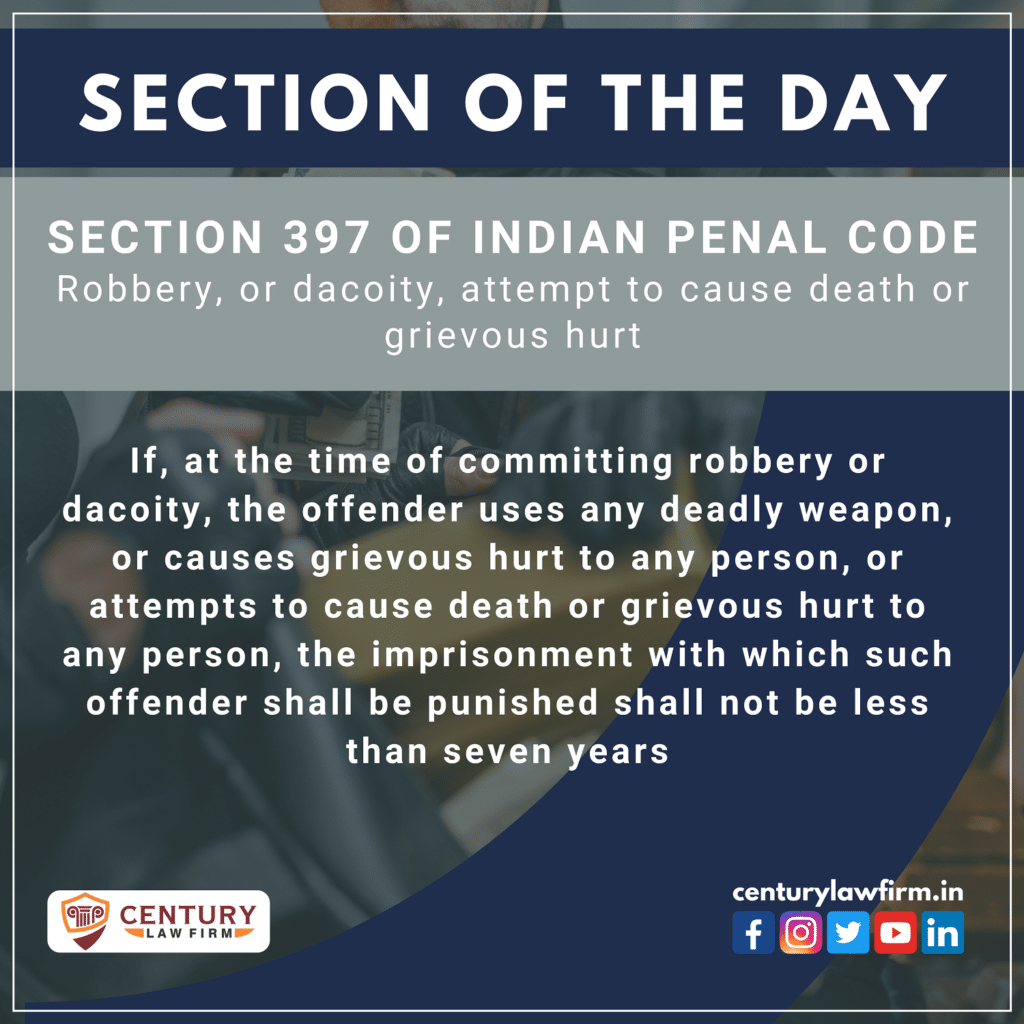Introduction to Section 397 IPC: Robbery or Dacoity with Attempt to Cause Death or Grievous Hurt
Section 397 in The Indian Penal Code
Robbery, or dacoity, with attempt to cause death or grievous hurt.—If, at the time of committing robbery or dacoity, the offender uses any deadly weapon, or causes grievous hurt to any person, or attempts to cause death or grievous hurt to any person, the imprisonment with which such offender shall be punished shall not be less than seven years.
Understanding the Offense Under Section 397 IPC
Section 397 of the Indian Penal Code (IPC) deals with the offence of robbery or dacoity with an attempt to cause death or grievous hurt. It is a serious criminal offence and is meant to address acts of violence and theft.
According to Section 397, if during the commission of robbery or dacoity (which is a group robbery), the offender attempts to cause the death of any person or causes grievous hurt to any person, the punishment is imprisonment for a term which shall not be less than seven years and may extend to imprisonment for life, along with a fine.
Defining Robbery and Dacoity
Robbery is defined as the act of voluntarily causing or attempting to cause to any person on the spot, the death of, or grievous hurt to, the person who is being robbed, in order to commit the robbery. It involves using force or violence to commit theft.
Dacoity, on the other hand, is a form of robbery where five or more persons come together to commit a robbery. The intention is to intimidate and use force against the victims to facilitate the robbery. Dacoity is considered a more serious crime than robbery due to the involvement of multiple offenders.
The Severity of the Offense Under Section 397 IPC
Section 397 specifically addresses situations where the offender attempts to cause death or grievous hurt during the course of a robbery or dacoity. The intention to cause harm or the actual infliction of severe injuries elevates the seriousness of the offence.
Punishment Under Section 397 IPC
The punishment for such acts under Section 397 is imprisonment for a term which shall not be less than seven years and may extend to imprisonment for life, along with a fine. The specific sentence imposed depends on the circumstances of the case, such as the severity of the injuries caused, the presence of aggravating factors, and the criminal history of the offender.
Case Example of Section 397 IPC
An example case demonstrating the severity of Section 397 is ‘The State of XYZ vs ABC’ . In this case, a group of individuals committed dacoity and, in the process, inflicted grievous injuries on the victims. The court, invoking Section 397, sentenced the perpetrators to rigorous imprisonment, emphasizing the gravity of their actions and the intent of the law to punish such heinous crimes sternly. This judgment serves as a stark reminder of the legal consequences of combining theft with violence and the robust legal mechanisms in place to address such offenses.
Conclusion: The Implications of Section 397 IPC
In conclusion, Section 397 of the IPC deals with the offence of robbery or dacoity with an attempt to cause death or grievous hurt. The punishment for this offence is imprisonment for a term which shall not be less than seven years and may extend to imprisonment for life, along with a fine. This section aims to deter and punish serious acts of robbery and dacoity that involve a threat to human life and physical well-being.


